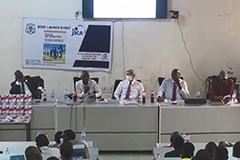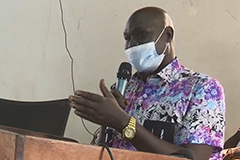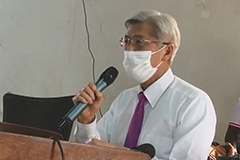Peace and Unity Through the Power of Sports: Seminar Held in South Sudan to Commemorate the Publication of a Project History Book
2022.06.08
On March 17, 2022, JICA Ogata Sadako Research Institute for Peace and Development (JICA Ogata Research Institute) held a seminar in conjunction with the Ministry of Youth and Sports of the Government of South Sudan and the University of Juba to commemorate the publication of a Project History book entitled “Peace and Unity Through Sports: South Sudan’s First ‘National Unity Day’ and Its Inaugural Olympic Participation,” which was hosted at the university.
An unstable social situation had persisted in South Sudan due to conflict and violence, but in 2016, JICA and the Government of South Sudan held the first National Unity Day, a national sport event, with the aim of bringing people together through sports. The book’s author, Furukawa Mitsuaki (currently a professor at the University of Shizuoka), was appointed as the chief representative of JICA South Sudan Office in November 2014, and was involved with organizing this event. In the book, Furukawa explains the background of the repeated conflicts in South Sudan and the significance of sports events in peacebuilding efforts.

The book launch attracted students from the Juba University and more (Photo by the University of Juba)
At the outset of the seminar, Yamanaka Yoshifumi, a representative of JICA South Sudan Office, and Abraham Kuol Nyuon, dean of the School of Social and Economic Studies of the University of Juba, delivered the opening remarks. Yamanaka noted that athletes who participated in National Unity Day, as well as those who were involved in running the event, were able to feel a sense of unity and form new friendships, and that through sports, positive change has been brought about at an individual and social level. He then called for South Sudanese youth to participate in the sports events to promote peace and social cohesion among communities. Following Yamanaka, Abraham stated that universities are places where there is no segregation, and after graduation, those who studied at the university should become leaders who can bring the people of South Sudan together, therefore, the introduction of peace through sports programs is a great initiative. He concluded by stressing that academics and sports are avenues for citizens to make their country a better place to live.

Abraham Kuol Nyuon, dean of the School of Social and Economic Studies of the University of Juba (Photo by the University of Juba)
After the opening remarks, Furukawa took the stage to introduce the content of the book. Furukawa noted that at the time, many civilians had been killed in conflict, and there was a sense of distrust toward the government. However, when he saw people enjoying playing soccer together—regardless of their different ethnic backgrounds—in the midst of conflict, he was convinced that a sports event would enhance the sense of national unity, and this sparked the movement for holding the National Unity Day. Although the first National Unity Day was held peacefully in 2016, conflict relapsed, and he had started to give up on the idea of sending athletes to the Olympics, which would be held in Rio de Janeiro that same year. Then-JICA President Kitaoka Shinichi commented to Furukawa, who had felt discouraged, that it was precisely because of this situation that they needed to bolster the unity and self-esteem of the South Sudanese people through the Olympics, which are a symbol of peace. Furukawa, who reaffirmed the importance of sports through that remark, continued to work with the local people. Following the Rio de Janeiro Olympics, the first time for South Sudan to participate, the country was also able to send a team of athletes to the Olympics held in Tokyo in 2021. He closed his speech by stating that “When we play sports, everyone has to put down their guns for a moment. Let's switch from fighting with guns to fighting through sports, and compete together for peace!”

The book’s author, Furukawa Mitsuaki (Photo by the University of Juba)
For the panel discussion, which was moderated by Abraham, Edward Settimo Yugu, director general of the Ministry of Youth and Sports, Joseph Omirok, the coach for the Olympic team, Edmond Yakani, civil society activist and Furukawa joined as panelists. They engaged in a lively discussion about the meaning of National Unity Day and Olympic participation for South Sudan, as well as future challenges and how to deal with them. During the Q&A session, participants expressed various questions and opinions. One of the participants commented that although the South Sudanese delegations for track and field and soccer are performing brilliantly, the environment for sports on the ground is still faced with a difficult situation, and the government needs to play a substantial role in ensuring that more young people have opportunities to play sports.
Finally, Martin Logo, lecturer at the University of Juba, closed the seminar by stating that this was an excellent opportunity to mutually affirm the value of sports and we should continue our part in creating a better society through the promotion of sports.

事業事前評価表(地球規模課題対応国際科学技術協力(SATREPS)).国際協力機構 地球環境部 . 防災第一チーム. 1.案件名.国 名: フィリピン共和国.

事業事前評価表(地球規模課題対応国際科学技術協力(SATREPS)).国際協力機構 地球環境部 . 防災第一チーム. 1.案件名.国 名: フィリピン共和国.

事業事前評価表(地球規模課題対応国際科学技術協力(SATREPS)).国際協力機構 地球環境部 . 防災第一チーム. 1.案件名.国 名: フィリピン共和国.

事業事前評価表(地球規模課題対応国際科学技術協力(SATREPS)).国際協力機構 地球環境部 . 防災第一チーム. 1.案件名.国 名: フィリピン共和国.

事業事前評価表(地球規模課題対応国際科学技術協力(SATREPS)).国際協力機構 地球環境部 . 防災第一チーム. 1.案件名.国 名: フィリピン共和国.
scroll